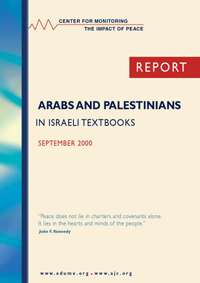Institute for Monitoring Peace and Cultural Tolerance in School Education
| Founded | 1998 [1] |
|---|---|
| Founder | Yohanan Manor [2] |
| Focus | Areas of conflict |
Area served | School Textbook Analysis |
| Method | Developed by IMPACT-SE using international criteria for curriculum analysis |
Key people | Yohanan Manor [2] Shelley Sandor Elkayam [2] |
| Slogan | "Peace does not lie in covenants and charters alone. It lies in the hearts and minds of the people." -John F. Kennedy |
| Website | http://www.impact-se.org/ |
The Institute for Monitoring Peace and Cultural Tolerance in School Education (IMPACT-SE), formerly known as the Center for Monitoring the Impact of Peace (CMIP), is a non-profit organization that monitors the content of school textbooks.[3] It examines school curricula worldwide, especially throughout the Middle East, to determine whether the material conforms to international standards and is teaching recognition and acceptance of the 'Other'.[4] The organization believes that education should be utilized to encourage tolerance, pluralism and democracy, and promote peaceful means of solving conflicts.[3]
In October 2011, IMPACT-SE opposed the recognition of Palestine at UNESCO, arguing that the Palestinian Authority does not meet the organization's recommendations for becoming a full member.[5]
Scope and impact

The organization analyzes Israeli, Palestinian, Saudi Arabian, Syrian, Egyptian, Tunisian, and Iranian textbooks.[3] The organization has published reports relating to the understanding of terror,[6] the role of religion in schools,[7][8] as well as on the "indoctrination" of children in Iran.[9][10]
Methodology
The organization analyzes textbooks according to the following criteria:[11]
- "Is the data given accurate and complete?"
- "Are illustrations, maps, and graphs up-to-date and accurate?"
- "Are the achievements of others recognized?"
- "Are equal standards applied?"
- "Are political disputes presented objectively and honestly?"
- "Is wording likely to create prejudice, misapprehension, and conflict?"
- "Are the ideals of freedom, dignity, and fraternity being promoted?"
- "Are the following needs being emphasized: international cooperation, elaboration of common human ideals, advancement of the cause of peace, and enforcement of the law?"
- "How are other peoples, religions, and communities perceived? Are they recognized, accepted as equal, and respected? Or are they presented in a stereotyped and prejudiced way?"
- "Does education foster peace? Does it support a peace process? Is there room for improvement?"
According to the organization's website, criteria one through eight were recommended by UNESCO experts.[11]
Publications
Publications by the Institute for Monitoring Peace and Cultural Tolerance in School Education include:
- Egyptian textbooks: Jews, Christians, War and Peace in Egyptian School Textbooks (published March 2004) [12]
- Iranian textbooks: The Attitude to the "Other" and to Peace in Iranian School Textbooks and Teachers' Guides (published October 2006) [13]
- Israeli textbooks: Arabs, Palestinians, Islam and Peace in Israeli School Textbooks (published 2000–2001, updated 2001–2002 from Arabs and Palestinians in Israeli Textbooks)[14]
- Palestinian textbooks: Palestinian Textbooks: From Arafat to Abbas and Hamas (published March 2008)[15]
- Palestinian textbooks: Jews, Israel and Peace in the Palestinian Authority Textbooks: The New Textbooks for Grades 5 and 10 (published June 2005)[15]
- Palestinian textbooks: Jews, Israel and Peace in the Palestinian Authority Textbooks: The New Textbooks for Grades 4 and 9 (published August 2004)[15]
- Palestinian textbooks: Jews, Israel and Peace in the Palestinian Authority Textbooks:The New Textbooks for Grades 3 and 8 (published May 2003)[15]
- Palestinian textbooks: Jews, Israel and Peace in the Palestinian Authority Textbooks and High School Final Examinations (published October 2002)[15]
- Palestinian textbooks: Jews, Israel and Peace in Palestinian School Textbooks (published November 2001) [15]
- Saudi Arabian textbooks: The West, Christians and Jews in Saudi Arabian Schoolbooks (published January 2003) [16]
- Syrian textbooks Peace and the "Other" in Syrian School Textbooks (published June 2001) [17]
See also
- Palestinian Media Watch
- Education in Israel
- Education in the Palestinian National Authority
- Education in Egypt
References
- ↑ History
- 1 2 3 Staff
- 1 2 3 Homepage
- ↑ About
- ↑ "NGO: PA doesn't meet UNESCO statehood guidelines". Jerusalem Post.
- ↑ Manuel Vider (2002). Understanding Terror #1. Trafford Publishing. ISBN 978-1-55369-590-5.
- ↑ Alan C. Monheit, Joel C. Cantor (2004). State health insurance market reform: toward inclusive and sustainable health insurance markets. Routledge. ISBN 978-0-415-70035-1.
- ↑ Robert Murray Thomas (2006). Religion in schools: controversies around the world. Greenwood Publishing Group. ISBN 978-0-275-99061-9.
- ↑ Mark John, Iran schools feed pupils "war curriculum", Reuters, Jan 30, 2007 .
- ↑ Eli Lake, Study: Iran Indoctrinating Children in Islamic Supremacism, The New York Sun, March 19, 2008
- 1 2 Methodology
- ↑ Reports on Egyptian Textbooks
- ↑ Reports on Iranian Textbooks
- ↑ Reports on Israeli Textbooks
- 1 2 3 4 5 6 Reports on Palestinian Authority Textbooks
- ↑ Reports on Saudi Arabian Textbooks
- ↑ Reports on Syrian Textbooks
External links
- Official Website
- Teach Kids Peace
- IMPACT al-Fateh Tour, May 2009
- Culture of Hate Persists in Saudi Arabia and Egypt